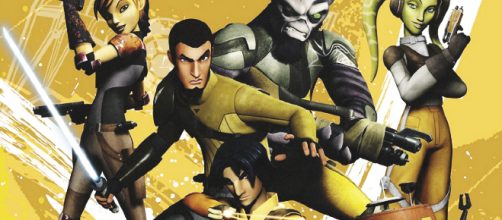Back in 1978, the extraordinary vision of filmmaker George Lucas took the world by storm with the release of "Star Wars." Beyond its box office numbers, "Star Wars" left a profound, lasting impression upon the world. Through its expanding, rabid fan base over the decades, it developed a religious-like following. That notoriety continued well into the 2000s when Lucasfilm released the controversial prequel era of films. Ever since the introduction of the prequel films and new trilogy films, every "Star Wars" film released has been met with a varied mix of love and hate.
While every film or creative endeavor will receive a fair amount of differing opinions, the criticism generated by "Star Wars" fans exists on a different level. Amidst the mixed reviews of "The Force Awakens" and "The Last Jedi," the brilliance of its recent animated show "Star Wars Rebels" and its predecessor "Star Wars: The Clone Wars" have gone under the radar.
Hidden gems
When Disney announced the inception of "Star Wars Rebels," it was met with much skepticism. Surprisingly, "Rebels" found a balance between marketing to a younger demographic and creating content that adhered to long-time aficionados by paying homage to the franchise's lore, as reported by Collider. Nothing showcased the success of "Rebels" more than its recent series finale.
Over the last few years, fans have become accustomed to having to defend their opinions of the latest movies due to the mixed reactions garnered in reviews. With the "Rebels" series finale, there was no such outrage or anger. There was just an overall feeling of satisfaction. Granted, not everything was flawless about the "Rebels" finale or even the show as a whole, but in the end, the show told a true "Star Wars" story: a journey of self-discovery for a young hero and his comrades embroiled within a galactic conflict.
Adding further layers
Whether certain fans loved or hated the material generated from the prequel films, it was apparent that there were indeed issues with the films: poor dialogue at times, expedited plot points, and poor character development. All of those issues were rectified within the context of "The Clone Wars" animated series.
By adding much-needed depth in various aspects, the "Star Wars" universe grew exponentially from "The Clone Wars" series. As noted by Forbes, "The Clone Wars" gave a much-needed personalization to the clone troopers along with clarifying Anakin's fall to the dark side.
That track record continued into "Star Wars Rebels," the successor to "The Clone Wars" series, as "Rebels" looked to flesh out the gap of time between episode III and episode IV. In a lot of ways, "Rebels" mirrored the goals of the recent films. Both shows aimed to garner support from a new fan base ("Rebels" focused on kids, the new trilogy focused on women); both looked to create stories separate from the Skywalker narrative ("Rebels" succeed while the new trilogy received mixed reactions on the Skywalker treatment); both looked to establish a new group of characters for fans to enjoy.
Clear direction
Where the animated series shined, the new trilogy seems to falter: clear direction. Despite the complaints of George Lucas' creative ideas during the prequel era, they still flowed together since it was guided by a clear, creative direction. The new trilogy of films certainly seems to lack that creative direction and design. Granted, TV series have much more versatility in terms of world-building than their movie counterparts, but a clear direction for any sort of creative endeavor pays dividends.
During its four-year run, "Rebels" aimed to tell one story: how the Rebel Alliance and the spirit of rebellion came into formation. That clear focus allowed for the creative team to construct a narrative highlighting the oppressive elements of the Empire while intertwining the personal growth of its cast.
Detailed character development
Character development is one of the areas the animated series has excelled in. In comparison to the live-action portrayal of Anakin Skywalker, "Star Wars" fans have generally preferred the portrayal of his Clone Wars counterpart. The reason lies with the fact that the animated series carefully constructed the man that would someday become Vader.
It was apparent that "The Clone Wars" staff had a clear idea of who they wanted Anakin to be. The same can be attested to the "Rebels" protagonist Ezra. There was no misdirection or mystery of his heritage that drove his character. What drove and developed him all the way to the end was a longing sense of purpose and his desire to liberate his home.


